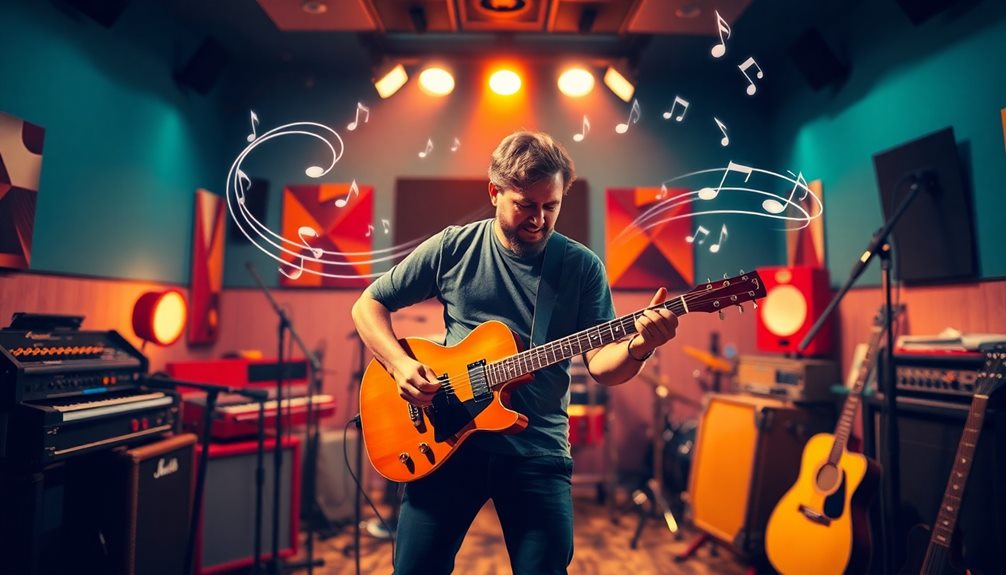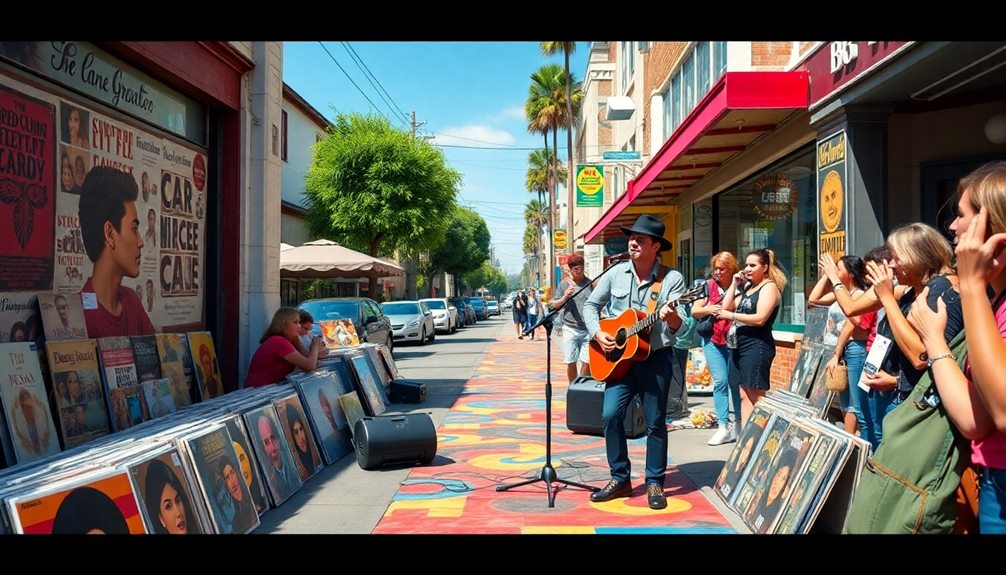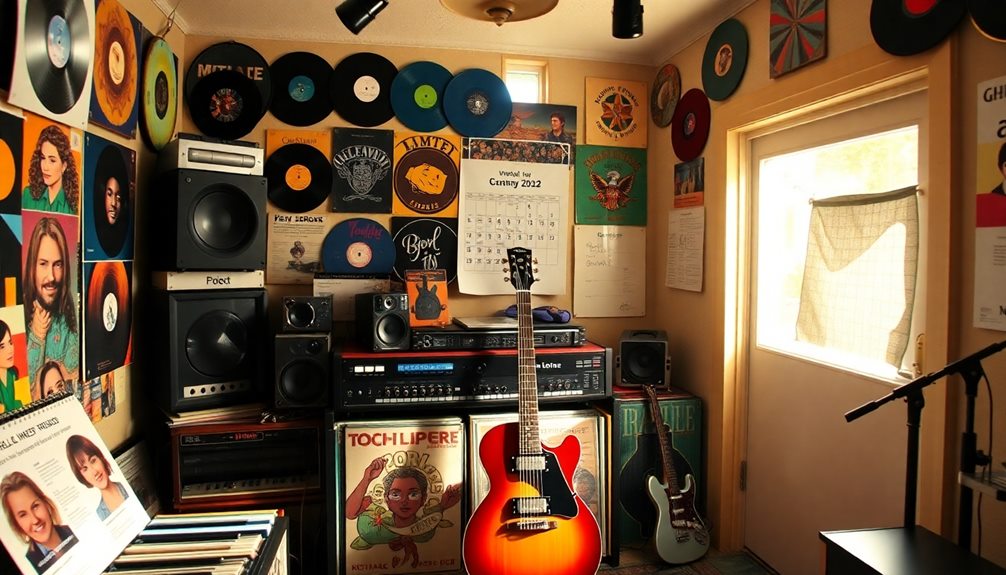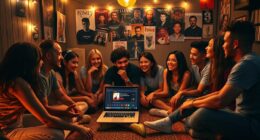To avoid music plagiarism and protect your work, start by creating unique melodies and lyrics. It's essential to understand the difference between influence and copying. To keep your creations safe, consider registering your compositions with the U.S. Copyright Office. This gives you legal rights and proof of ownership! You can also use digital platforms like Musicdibs, which help secure your music using blockchain technology. Remember to experiment with different styles and collaborate with other artists to find your unique voice. Want to know more tips on protecting your sound? There's plenty more to explore ahead!
Key Takeaways
- Create original melodies and lyrics by exploring diverse styles and themes to ensure your work is distinct from others.
- Document your songwriting process and inspirations in a journal to track your creative evolution and avoid unintentional similarities.
- Register your compositions with the U.S. Copyright Office for legal proof of ownership and stronger protection against infringement claims.
- Utilize platforms like Musicdibs to encrypt your music using blockchain technology, providing secure proof of ownership and dispute resolution support.
- Collaborate with musicians from different genres to gain fresh perspectives and inspire innovative, original compositions.
Understanding Musical Plagiarism
Musical plagiarism can take many forms, and understanding these nuances is essential for any songwriter. Plagiarism happens when someone uses or copies another person's musical compositions without permission.
There are different types of plagiarism, like direct copying or blending bits from many songs, which is called mosaic plagiarism. As a songwriter, you want to avoid musical pitfalls that could lead to legal action.
It's also important to be aware of how your production setup, including your affordable music production setups, can influence your creative process and originality. One famous case involved Robin Thicke's song "Blurred Lines," which resulted in a hefty $7.4 million penalty for copyright infringement. That's a tough lesson in the music industry!
To protect your intellectual property, it's vital to keep track of your original work. You can document your creations and even register them legally to strengthen your defense.
The Berne Convention and WIPO Copyright Treaty offer some protection, but they differ from country to country. This means you might need expert advice to help sort things out if a dispute arises.
Influence vs. Plagiarism

Artistic inspiration often walks a fine line between influence and plagiarism. When you create a musical work, it's crucial to understand this difference. Influence means you're inspired by other songs, while plagiarism is when you copy melodies, lyrics, or compositions without giving credit.
This copying of others' works can lead to trouble, especially with copyright laws in play. AI-driven tools can also enhance your creative process, offering AI customizes learning experiences that help you understand the nuances of musical composition and originality.
Notable cases, like Robin Thicke's "Blurred Lines," show how serious this can be. He faced hefty fines for crossing that line from influence into plagiarism. To keep your music original, avoid reusing specific melodies or chord progressions from songs you love. Instead, focus on crafting your own stories in your lyrics.
You can also explore different musical styles and experiment with unique instruments. This helps you create a sound that truly reflects your voice, rather than just imitating others.
Strategies for Originality

Finding ways to create original music can feel intimidating, but there are effective strategies that can help you carve out your unique sound. First, try brainstorming sessions! These can spark unique ideas and themes, letting your creativity flow freely.
Keeping in mind the importance of personalized learning pathways can also inspire you to find your own musical voice. Additionally, keep a songwriting journal, too. Document your inspirations and thoughts, which helps track original concepts and refine your lyrics over time.
Don't forget to analyze popular songs. Understanding what makes them successful can inspire your original interpretations without falling into plagiarism.
Collaborating with artists from different genres is another fantastic way to gain fresh perspectives. This can lead to innovative musical elements and unique compositions.
Moreover, be bold and experiment! Try different instruments and song structures to create distinct sounds. Mixing it up can set your work apart from others.
Remember, originality is about taking risks and making your music truly yours. By following these strategies, you'll not only enhance your songwriting but also protect your creative spirit.
Legal Protections for Music

When it comes to safeguarding your creative output, understanding legal protections for music is essential. Copyright is your best friend! It grants you exclusive rights to your musical compositions, protecting them from unauthorized use and imitation. To further protect your work, consider registration with the U.S. Copyright Office. This provides legal proof of ownership, which is super important if you ever need to claim damages due to infringement.
Here's a handy table to help you understand key aspects of music legal protections:
| Protection Type | Description |
|---|---|
| Copyright | Grants exclusive rights to your music |
| Registration | Legal evidence of ownership |
| Fair Use | Limited use of copyrighted material without permission |
| Licensing Agreements | Necessary for using samples or covers |
| Duration of Copyright | Life of the creator plus 70 years |
Using Musicdibs for Security

With the rise of digital platforms, safeguarding your music has never been more essential. You want your original compositions to shine without the fear of plagiarism. That's where Musicdibs comes in! This amazing platform uses blockchain technology to help you protect your work. When you upload your music, it gets encrypted, and you receive proof of ownership that's hard to dispute.
Imagine you're sharing your latest track online. By using Musicdibs, you can avoid plagiarism worries, knowing that your work is securely registered. If there's ever a dispute, you'll have accessible receipts with registration data that judges and musicology experts can verify.
Just think about how Thicke and Pharrell faced challenges over their song; you can avoid that stress by taking proactive steps.
Musicdibs is user-friendly, making it easy to register your creations. This way, you can focus on what you love—creating music! Plus, it encourages collaboration and creativity in the music community.
Frequently Asked Questions
How to Avoid Music Plagiarism?
To avoid music plagiarism, you should engage in conscious listening, use technology for similarity detection, keep a songwriting journal, experiment with diverse styles, and collaborate with various artists to enhance your originality and authenticity.
How Can I Protect My Work From Plagiarism?
Imagine your creative spark flickering in the dark. To protect your work from plagiarism, save originals, register with the Copyright Office, display notices, and monitor with tools. Your artistry deserves safeguarding—don't let it fade away.
How Can I Avoid Plagiarism in My Work?
To avoid plagiarism in your work, engage in active listening, diversify your influences, and experiment with styles. Use tech tools to check for similarities, keep a songwriting journal, and collaborate with diverse artists for fresh ideas.
What Counts as Music Plagiarism?
Music plagiarism counts as unauthorized use or imitation of another's composition, including direct copying of melodies, chord progressions, or lyrics. It's vital you understand these concepts to protect your own creative work effectively.
Conclusion
Now that you know how to spot and avoid music plagiarism, it's time to protect your creativity! Remember, every note you create is special, and you can keep it that way. Use the tools and tips we've shared to guarantee your unique sound shines. Imagine the joy of sharing your music with the world, free from worry! So, are you ready to release your creativity and make your mark? The stage is set, and the spotlight's waiting for you!









